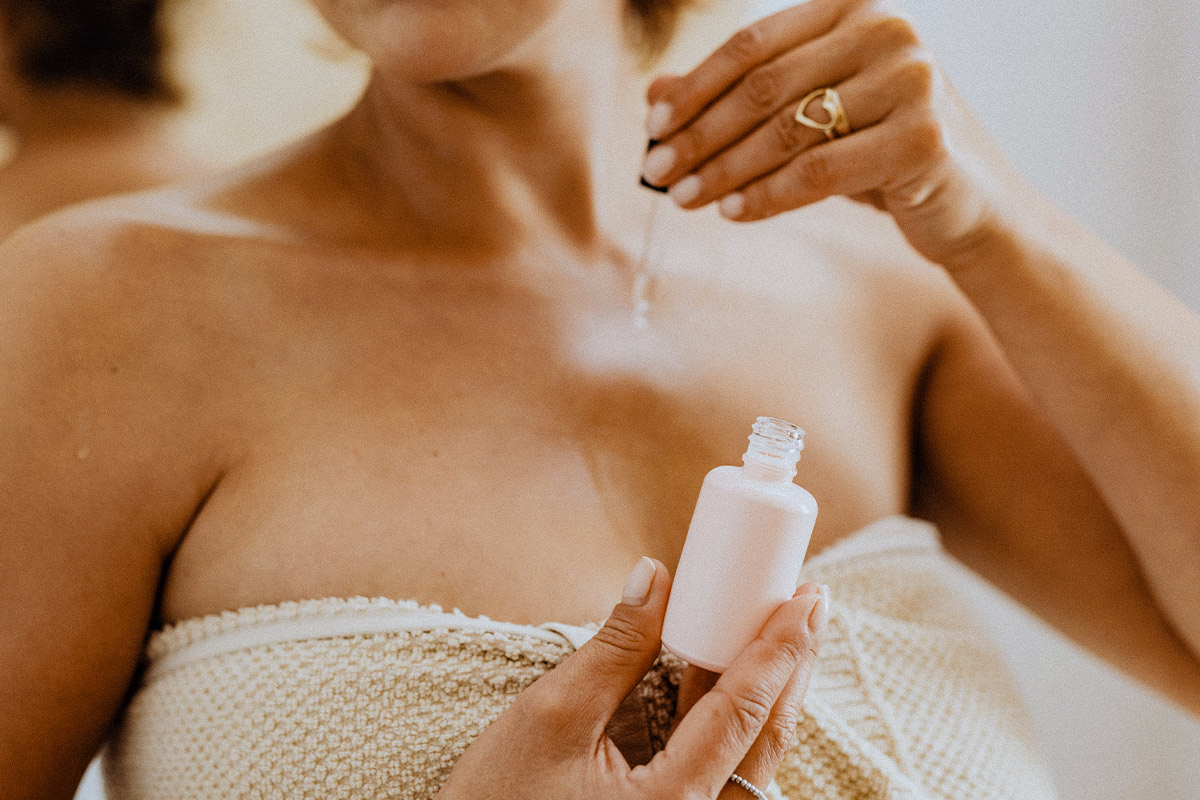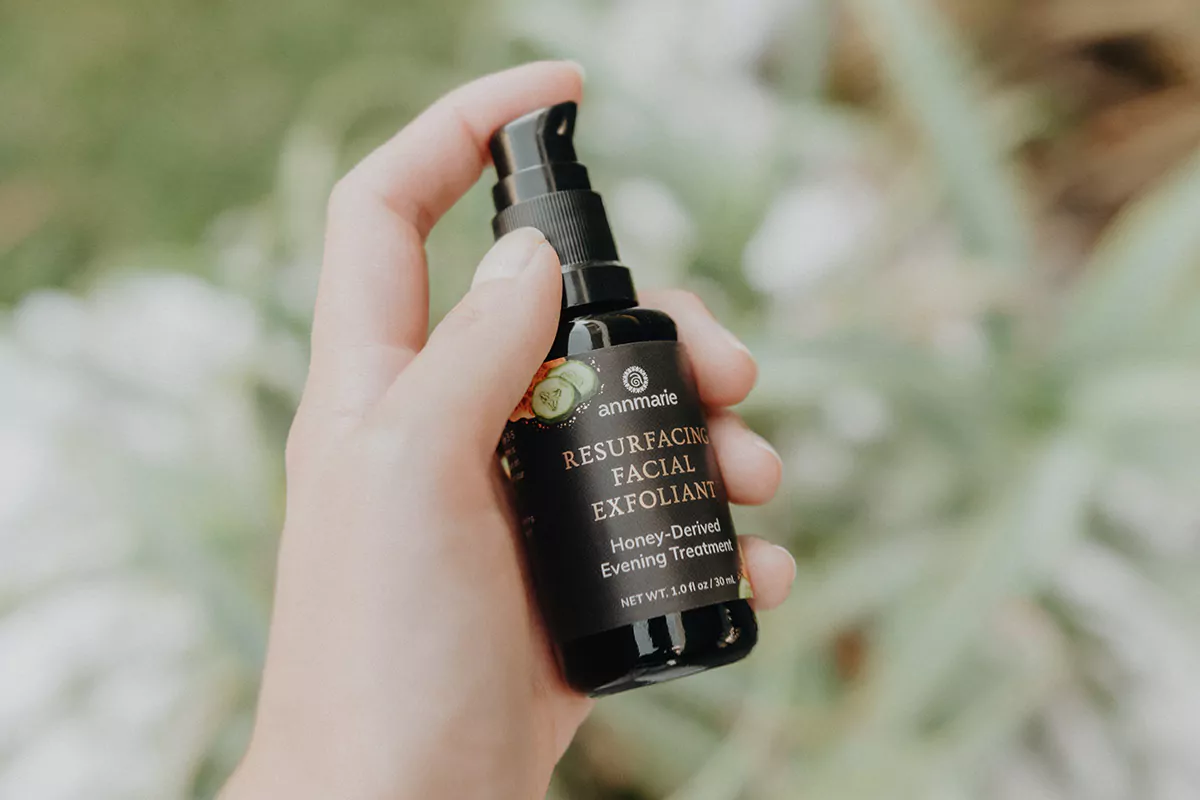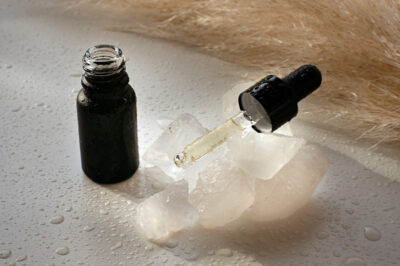Table of Contents[Hide][Show]
What Is Glycerin?
Glycerin, also used interchangeably with glycerol, is a familiar plant-based ingredient you may recognize from your moisturizers, creams or lotions. Popular for being a humectant—its main function in skin care is to attract and retain multiple times its own weight in moisture. When you apply it to your skin, glycerin hydrates and revitalizes the look of your complexion, leaving it feeling soft, supple and dewy.
Glycerin in skin care is ubiquitous, and you may see it as a familiar ingredient across various personal care products. Gentle and non-irritating, glycerin has a transparent, viscous and syrupy texture that may feel slick, slippery and oily on your skin. As a popular ingredient in anti-aging skin care products, incorporating glycerin into your routine for its hydrating benefits can come down to your preference of how you like your skin care products to feel on your skin. Overall, glycerin’s incredibly effective for reviving your skin and is suitable for all skin types, so even the most sensitive can experience its benefits.
Where Does Glycerol Come From
Glycerol is usually derived from natural sources such as plant oils or animal fats. Here’s how the process of creating glycerol works. Using a natural vegetable oil, the oil is hydrogenated to create fatty acids and triglycerides. The glycerol is then extracted and purified to produce the final product. In this form, it’s used in various industries, including cosmetics and personal care, but also food, beverages and pharmaceuticals.
Although glycerol can be derived synthetically, most skin care and personal care products usually source their glycerol naturally (just remember to check your labels!). For example, at Annmarie Skin Care, our glycerin is sourced non-GMO and certified organic from solely vegetable sources like coconut oil. All our hydrating ingredients that can be found in Annmarie Skin Care serums, including glycerol, hyaluronic acid, saccharide isomerate and tremella mushroom extract, are naturally sourced, cruelty-free and vegan.
Benefits of Glycerin in Skin Care

Glycerin is a stable and commonly used ingredient that you’ll find across a wide variety of skin care products, from moisturizers and masks to cleansers and serums. Here are five reasons why glycerin is such a popular skin care ingredient:
Hydration
As a humectant, glycerin draws moisture from the air, which gets absorbed into the skin—helping to keep your skin hydrated and healthy. This also provides a softening and plumping effect for your skin.
Skin soothing
Glycerin provides a nourishing, calming and soothing effect on your skin, making it excellent for sensitive skin types or calming temporary redness and unhappy skin.
Hydration
As a humectant, glycerin draws moisture from the air, which gets absorbed into the skin—helping to keep your skin hydrated and healthy. This also provides a softening and plumping effect for your skin.
Skin soothing
Glycerin provides a nourishing, calming and soothing effect on your skin, making it excellent for sensitive skin types or calming temporary redness and unhappy skin.
Cleansing
A popular ingredient in cleansers, glycerin gently cleanses and removes impurities without stripping away your skin’s natural oils, leaving it feeling refreshed and nourished.
Strengthens skin barrier
By attracting and locking in moisture, glycerin also helps to enhance your skin’s natural barrier function and protect it from environmental stressors and pollutants.
Improves skin texture
As a powerful hydrator, glycerin helps to smooth out the look of fine lines and improve the overall texture of your skin for a soft, supple look and feel.
Is Glycerin Good for All Skin Types?
Glycerin is gentle and non-toxic while effectively hydrating and nourishing any skin type, including sensitive skin. But whether glycerin is suitable for your skin depends on whether you like the feel and texture of the formula you choose. Pure glycerin, or a high concentration of glycerin in your product, can feel heavy and sticky on your skin. But when used in conjunction with other ingredients, it can result in a lighter and less greasy feel. It all depends on the formula.
At Annmarie Skin Care, we love balancing glycerin with the lighter feel and weight of other hydrating ingredients to supercharge their nourishing effects on your skin. We use a 100% plant-derived water-binding ingredient called saccharide isomerate alongside glycerin in our Citrus Stem Cell Serum, Illuminating Pearl Mask and Phytonutrient Cleanser for a lighter and more elegant feel. We also use tremella mushroom extract, another powerful humectant, with glycerin in our Probiotic Serum with Tremella to be a potent hydrator for your skin.
Dry Skin
Glycerin is excellent for those with dry skin because of its humectant properties. It draws moisture from the air, delivering it to your skin and locking it in. Your skin is left feeling soft, supple and nourished. By strengthening your skin’s natural barrier, glycerin also helps to protect your skin against environmental stressors and pollutants. This can further help reduce the appearance of dryness, flakiness and the appearance of aging on your skin. Used consistently, glycerin helps to restore your skin’s natural radiance and gives you long-lasting hydration for a healthy, youthful complexion.
Oily Skin
Even with its sticky, oily feel, glycerin is completely non-comedogenic—which means it won’t clog your pores—making it great for oily skin. Because of its hydrating properties, glycerin can help balance your skin’s natural oils. Used in a lighter concentration with a lightweight formula, glycerin can help hydrate your skin, leaving it refreshed and balanced. Depending on your preference and if you’d like to try glycerin, look for a lighter concentration or a glycerin-based formula specifically designed for oily skin types—especially as some oilier skin types may not prefer the stickier texture of glycerin on skin. Experience glycerin in our Citrus Mint Cleanser, formulated for oilier skin types and fantastic to use for a deeper post-workout cleanse.
Combination Skin
As a humectant, glycerin has excellent benefits for combination skin, which is characterized by dry and oily areas. On the one hand, glycerin attracts and retains moisture in your skin, which helps hydrate your skin and nourishes those dry patches. Glycerin is also a non-comedogenic ingredient that won’t clog your pores. It helps balance the skin’s natural oils for a less oily look and feel to your skin. With its ability to maintain skin moisture levels, incorporating glycerin into your skin care routine can help to soothe, hydrate, balance and nourish combination skin, promoting a healthy, even and radiant complexion.
Sensitive Skin
Glycerin’s a gentle, non-toxic and non-irritating ingredient, making it ideal for sensitive skin types. Its beneficial properties help hydrate, soothe and nourish sensitive skin types without causing adverse reactions. As a clear and odorless ingredient with its non-comedogenic nature, glycerin may be a blessing for delicate skin types, as it doesn’t clog pores and calms temporary redness and irritations. Glycerin can also help strengthen your skin’s barrier protecting sensitive skin from environmental stressors and also improve the texture of your skin’s appearance, evening out the look of unhappy or irritated patches of skin. However, as everyone’s skin is unique and reacts differently to ingredients, make sure you conduct a patch test to see if glycerin suits your sensitive skin before incorporating it into your routine.
How To Use Glycerin for Skin Care

You can use glycerin by applying pure vegetable glycerin alone to your skin or use formulations containing glycerin in varying concentrations—experiment with what feels comfortable and good for your skin. Since glycerin has a sticky, syrupy feel, it may not apply as smoothly to your skin and may leave a greasy feeling. Depending on the formula and concentration, it truly depends on your preference.
At Annmarie Skin Care, we love the hydrating properties of glycerin mixed with multiple humectants to supercharge our formulations’ hydrating properties. Glycerin has a smaller molecular weight than other powerful humectants like hyaluronic acid. This makes glycerin fantastic for going deeper into your skin, while hyaluronic acid acts as a cushiony layer on top of your skin. Both humectants pull moisture from your body and the environment to keep your skin hydrated, plump and dewy.
Both glycerin and hyaluronic acid are used in our bestselling Anti-Aging Serum and our brightening Citrus Stem Cell Serum and Fruit Ceramide Eye Serum. Our serums include multiple humectants for their synergizing effects of plumping, hydrating and refreshing your skin. We’ve also paired glycerin with hyaluronic acid in our skin-reviving Resurfacing Facial Exfoliant—a gentle, non-irritating alpha hydroxy acid product. The multiple humectants in our natural facial exfoliant leave your skin deeply hydrated, clarified and fresh.
Glycerin Side Effects for Skin You Should Keep in Mind
As a gentle, non-toxic product, glycerin generally has no side effects on the skin. However, every person’s skin is different, and it’s always possible to have an allergic or adverse reaction to any substance, including glycerin. It’s always important to patch test if you’re unsure before using any product on your face. Also, start with a small amount first, then build up the quantity and frequency of use as your skin adjusts and feels comfortable with the new ingredient or product. If any adverse reactions occur, please stop immediately and speak with a dermatologist and health care professional.
Conclusion
Glycerin is a versatile and indispensable hydrating skin care ingredient that’s here to stay. It provides numerous skin benefits, including its ability to hydrate your skin and help balance your skin’s natural oils, which make it an excellent addition to any skin care routine. If you’re looking for a powerful hydrator to incorporate into your routine, utilize glycerin alongside other hydrating ingredients to help your skin look and feel its best.








Leave a Reply